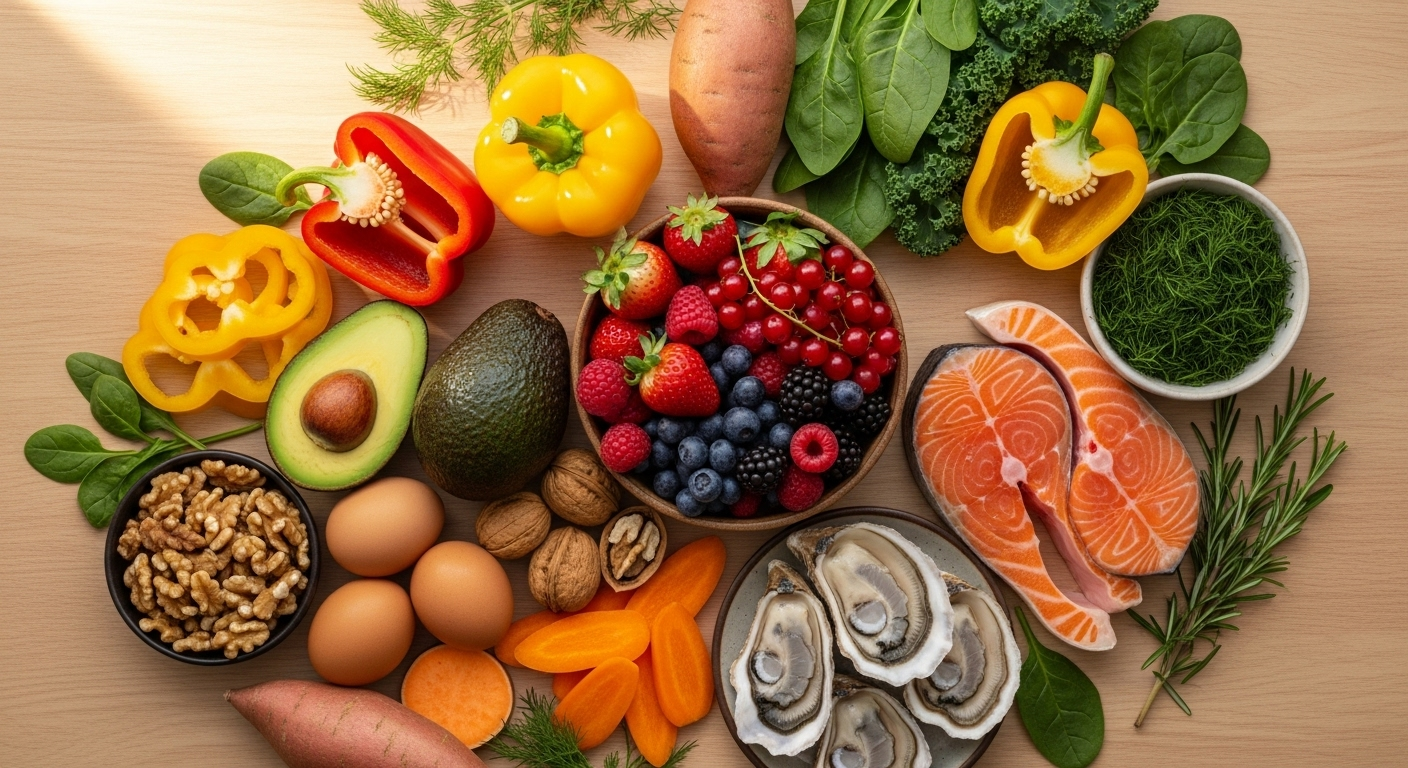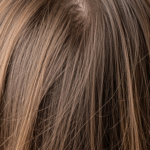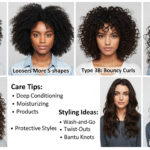Are you looking to boost your hair growth naturally? A healthy diet plays a crucial role in supporting strong, shiny hair. Certain foods are packed with essential nutrients that nourish your hair from the inside out, promoting optimal growth. In this article, we’ll explore the best foods good for hair growth, including vitamins, minerals, and …
Are you looking to boost your hair growth naturally? A healthy diet plays a crucial role in supporting strong, shiny hair. Certain foods are packed with essential nutrients that nourish your hair from the inside out, promoting optimal growth.
In this article, we’ll explore the best foods good for hair growth, including vitamins, minerals, and proteins that play a vital role in keeping your hair strong and healthy. By the end, you’ll know exactly what to eat to encourage hair growth and prevent hair loss.
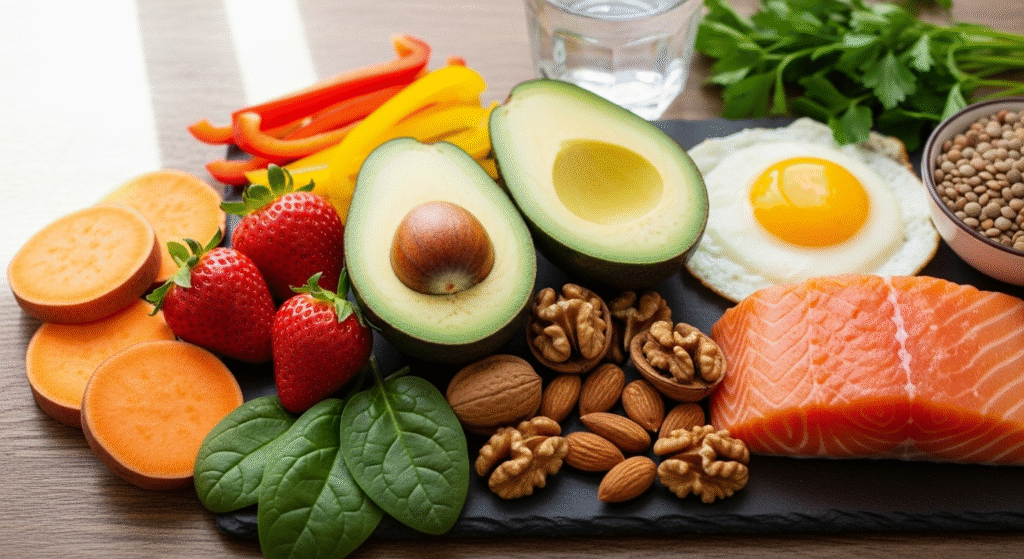
Essential Nutrients for Hair Growth
A balanced diet rich in essential nutrients is key to promoting healthy hair. Several vitamins, minerals, and proteins support the growth and overall health of your hair follicles. Let’s take a closer look at the most important nutrients for healthy hair growth.
Protein: The Building Block of Hair
Hair is primarily made up of keratin, a type of protein. Ensuring you consume enough protein is essential for hair growth, as it supports the production of keratin and strengthens each strand.
- Sources of Protein:
- Eggs: Rich in both protein and biotin, eggs are excellent for hair health.
- Lean meats: Chicken, turkey, and lean beef are excellent protein sources.
- Plant-based proteins: Beans, lentils, tofu, and quinoa are great alternatives for vegetarians and vegans.
Vitamins and Minerals for Healthy Hair
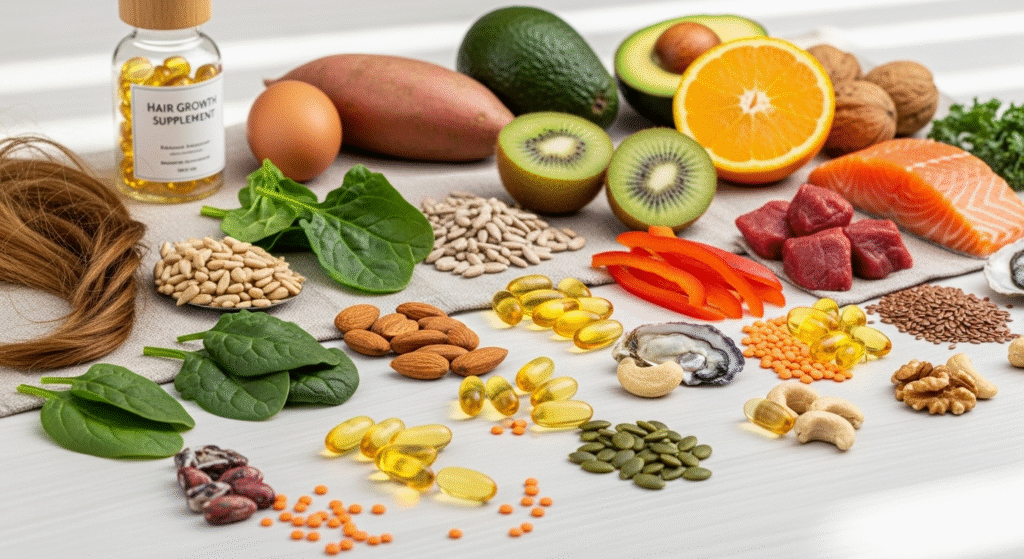
Vitamins and minerals are essential for maintaining healthy hair. They support hair follicles and prevent hair loss.
- Vitamin A: Promotes the health of the scalp by supporting the production of sebum, the natural oil produced by hair follicles. Sources include carrots, sweet potatoes, and spinach.
- Vitamin C: Supports collagen production, which strengthens hair and helps with iron absorption. Foods like citrus fruits, berries, and bell peppers are rich in vitamin C.
- Vitamin D: Vitamin D plays a role in the growth and activation of hair follicles. Lack of vitamin D is associated with hair loss, making it crucial for maintaining healthy hair.
- Sources: Fatty fish (salmon, mackerel), egg yolks, and fortified foods.
- Iron: Iron supports healthy blood circulation to the scalp, ensuring hair follicles receive the oxygen and nutrients they need. Foods like spinach, red meat, and lentils are good sources.
- Zinc: Zinc helps with tissue growth and repair, contributing to the healthy function of hair follicles. Pumpkin seeds, cashews, and chickpeas are excellent sources.
Best Foods to Support Hair Growth
Now that we know the essential nutrients, let’s dive into the specific foods good for hair growth that can help nourish your scalp and promote stronger, thicker hair.
Eggs: A Powerhouse of Protein and Biotin
Eggs are packed with protein, biotin, and essential fatty acids, all of which contribute to healthy hair growth. Biotin is particularly important for hair strength, and deficiency can lead to brittle hair and hair loss. By including eggs in your diet, you can provide your body with the necessary building blocks for hair health.
- How to incorporate eggs: Add boiled eggs to salads, scrambled eggs for breakfast, or use them as an ingredient in various dishes.
Spinach: Rich in Iron and Vitamin A
Spinach is loaded with iron, vitamin A, and vitamin C, all essential for healthy hair. Iron helps in carrying oxygen to the hair follicles, preventing hair loss, while vitamin A supports the production of sebum, which keeps the scalp moisturized and healthy.
- How to incorporate spinach: Enjoy spinach in salads, smoothies, or cooked as a side dish. Adding spinach to soups or stews is also an excellent way to increase your intake.
Sweet Potatoes: A Source of Beta-Carotene
Sweet potatoes are high in beta-carotene, which the body converts into vitamin A. Vitamin A nourishes the scalp and promotes healthy hair follicles. It also helps to prevent dry, flaky scalp, a common cause of hair breakage and shedding.
- How to incorporate sweet potatoes: Roast them, add them to soups, or mash them as a delicious and nutritious side dish.
Fatty Fish: Omega-3 Fatty Acids for Healthy Hair
Fatty fish like salmon, mackerel, and sardines are rich in omega-3 fatty acids, which are known to support healthy hair growth by keeping the scalp hydrated and nourishing hair follicles. Omega-3s also help prevent hair thinning and keep hair strands strong.
- How to incorporate fatty fish: Aim for at least two servings of fatty fish per week, whether grilled, baked, or in a salad.
Nuts and Seeds: Rich in Zinc, Vitamin E, and Healthy Fats
Nuts like almonds, walnuts, and seeds such as chia seeds and flaxseeds are packed with vitamin E, zinc, and healthy fats. Vitamin E is an antioxidant that helps protect the hair from oxidative stress, while zinc is vital for proper hair follicle function and tissue repair.
- How to incorporate nuts and seeds: Snack on a handful of mixed nuts, or add seeds to your smoothies, salads, or yogurt.
How Does a Healthy Diet Affect Hair Growth?
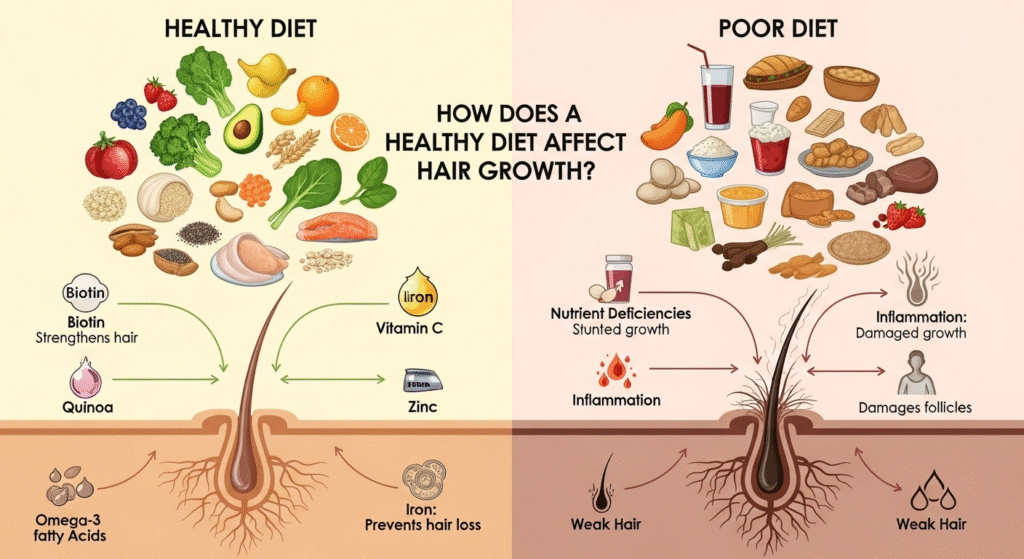
A nutrient-rich diet is the foundation for strong, healthy hair. If your body lacks the essential nutrients it needs, it may lead to hair thinning, shedding, or even hair loss. Conversely, a balanced diet filled with protein, vitamins, and minerals can help stimulate hair follicles and prevent hair loss.
Impact of Nutrient Deficiencies on Hair Health
- Iron Deficiency: One of the leading causes of hair loss, particularly in women, is iron deficiency. Consuming iron-rich foods like spinach, red meat, and lentils can help prevent this.
- Vitamin D Deficiency: Lack of vitamin D is linked to hair thinning, particularly in women and individuals with autoimmune conditions. Sun exposure and vitamin D-rich foods like fatty fish can help.
- Zinc Deficiency: Zinc is essential for hair tissue repair and the growth of hair follicles. Low zinc levels can cause hair shedding or thinning.
Improving Hair Health Through Nutrition
By consuming nutrient-dense foods, you can nourish your scalp and hair follicles, promote hair strength, and reduce shedding. Healthy hair requires ongoing nourishment from the inside out, so consistency in a nutrient-rich diet is key.
Foods to Avoid for Optimal Hair Health
While there are plenty of foods that promote healthy hair growth, some should be limited or avoided to maintain optimal hair health.
Highly Processed Foods and Sugar
- Refined sugar and highly processed foods can lead to inflammation, which affects hair growth. Excessive sugar can spike insulin levels, leading to hair thinning or shedding.
Excessive Alcohol and Caffeine
- Both alcohol and caffeine can dehydrate the body, affecting the moisture levels of your scalp and hair. This can lead to brittle hair and increased shedding.
Expert Opinions on Diet and Hair Growth
Real-life Case Studies
Many patients who incorporated a balanced diet of nutrient-rich foods, including omega-3s, vitamin D, and zinc, saw improvements in hair texture, thickness, and reduced shedding. One patient shared, “After three months of focusing on my diet, my hair feels thicker, and I have less breakage.”
FAQs
Which foods are best for hair growth?
Foods like eggs, spinach, fatty fish, and sweet potatoes are excellent for promoting hair growth due to their high levels of essential nutrients like protein, vitamins, and minerals.
Can I really make my hair grow faster by eating certain foods?
While food alone won’t dramatically speed up hair growth, it can significantly improve the health of your hair and prevent further hair loss or thinning.
What are the top vitamins for hair growth?
Biotin, vitamin A, vitamin C, vitamin D, and zinc are essential for promoting healthy hair growth and preventing hair loss.
How long does it take to see improvements in hair health?
You may start to notice improvements in hair texture and thickness within 3 to 6 months of adopting a hair-friendly diet.
How much protein should I eat for better hair growth?
Aim for 0.8-1 gram of protein per kilogram of body weight per day, which supports hair growth and overall follicle health.
Conclusion: A Balanced Diet for Better Hair Health
Eating the right foods is essential for promoting healthy hair growth. Incorporating a balanced diet rich in protein, iron, vitamins, and omega-3 fatty acids can support the health of your hair follicles and encourage hair regrowth.
Along with healthy eating habits, a well-rounded lifestyle that includes regular exercise, stress management, and proper hair care can contribute to thicker, stronger, and shinier hair.
Ready To Take Your Next step:
If you’re concerned about hair health or hair loss, consult with Dr. Uzma Irfan, an ISHRS-certified surgeon, to create a personalized diet plan that supports your hair growth goals. Book a consultation today!

